Demolition Contractors Exeter
Top 10 Demolition Contractors in Exeter
Get multiple Demolition Contractors Near Me quotes for your project today! Compare profiles, reviews, accreditations, portfolio, etc... and choose the best offer.

William Lawrence Excavating & Trucking
4.36 reviewsScranton, USAbout William Lawrence Excavating & Trucking William Lawrence Excavating and Trucking Company is a locally owned and operated business serving both residential and commercial clients in Montrose, PA for over 35 years. We take pride in our modern and well-maintained equipment, operated by a qualified, courteous, and reliable crew. Our commitment to safety is reflected in our fully insured operations. Whether you're planning a large or small project that requires excavating or trucking services, we offer free assistance in the planning stage and a free evaluation to help you find the most cost-effective methods available. We believe in delivering exceptional service and ensuring your project is completed to the highest standards. At William Lawrence Excavating & Trucking, we stand by our motto: "If We Start It…We Complete It!"
- Services
- Why Us?
- Gallery
Get Quote
Kuharchik Construction
4.428 reviews420 Schooley Ave, Exeter, 18643, USWE ARE KUHARCHIK CONSTRUCTION. Providing superior electrical contracting services throughout Pennsylvania since 1973. We’re local, we’re family owned, we’re union! Kuharchik is your first choice in Electrical Contracting. From Highway Signing & Lighting to Foundation Installation, we take pride in every job that we do.
- Services
- Why Us?
- Gallery
Get Quote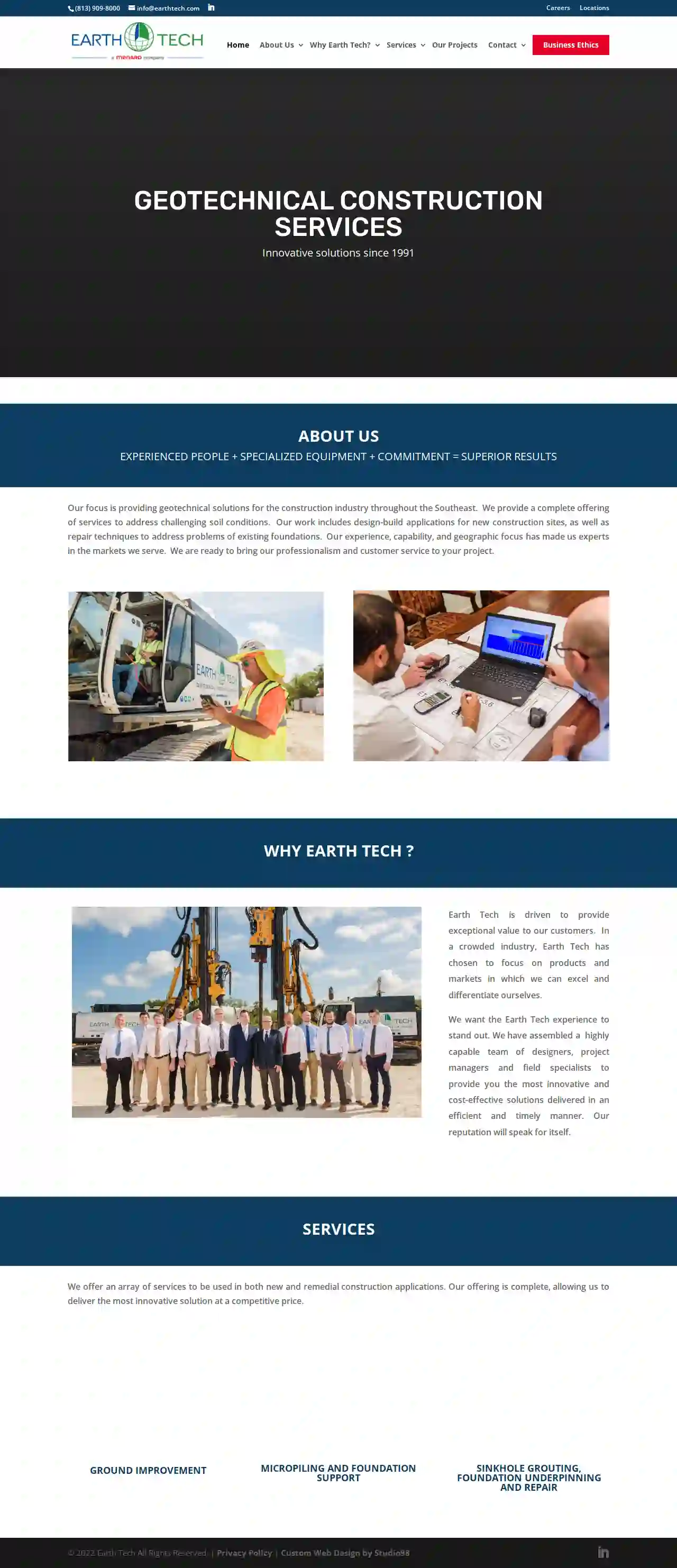
Earth Tech
York, USAbout Us Earth Tech is a leading provider of geotechnical construction services in the southeastern United States. We specialize in ground improvement, foundation support, and sinkhole remediation. Our team of experienced engineers, project managers, and field technicians is committed to providing our clients with the highest quality services and solutions. Company History Earth Tech was founded in 1991 by Ron Broadrick, a veteran of the geotechnical construction industry with over 40 years of experience. Ron’s vision was to create a company that would provide innovative and reliable solutions to the challenges faced by developers, engineers, and homeowners in Florida and beyond. Since its inception, Earth Tech has grown into one of the largest and most respected geotechnical construction companies in the state, with a reputation for quality, safety, and customer service. Menard Leadership Earth Tech is a proud member of the Menard USA family of companies. Menard USA is a leading provider of geotechnical construction services in North America. With a shared commitment to innovation, quality, and customer service, Earth Tech and Menard USA are working together to provide our clients with the best possible solutions. Why Earth Tech? Earth Tech is the premier choice for geotechnical construction services in the southeastern United States. We offer a wide range of services, including: Ground improvement Foundation support Sinkhole remediation Design and value engineering Project resources We are committed to providing our clients with the highest quality services and solutions. Our team of experienced engineers, project managers, and field technicians is dedicated to exceeding your expectations. Safety & Quality Safety is our top priority. We are committed to providing a safe and healthy work environment for our employees and the public. We have a comprehensive safety program that includes regular training, safety audits, and incident reporting. We are also committed to providing our clients with the highest quality services. We use only the best materials and equipment, and our team of experienced professionals is dedicated to delivering projects on time and within budget. Local Focus and Experience Earth Tech is a locally owned and operated company. We are committed to serving our community and providing our clients with the best possible service. We have a deep understanding of the local soil conditions and regulatory requirements, which allows us to provide our clients with the most effective and cost-efficient solutions. Design and Value Engineering Earth Tech has a team of experienced engineers who can provide design and value engineering services for your project. We can help you to develop the most cost-effective and sustainable solutions for your needs. Project Resources Earth Tech has a wide range of resources available to our clients, including: Experienced engineers Project managers Field technicians Specialty equipment Grout material production We are committed to providing our clients with the resources they need to ensure the success of their projects.
- Services
- Why Us?
- Our Team
- Testimonials
- Gallery
Get Quote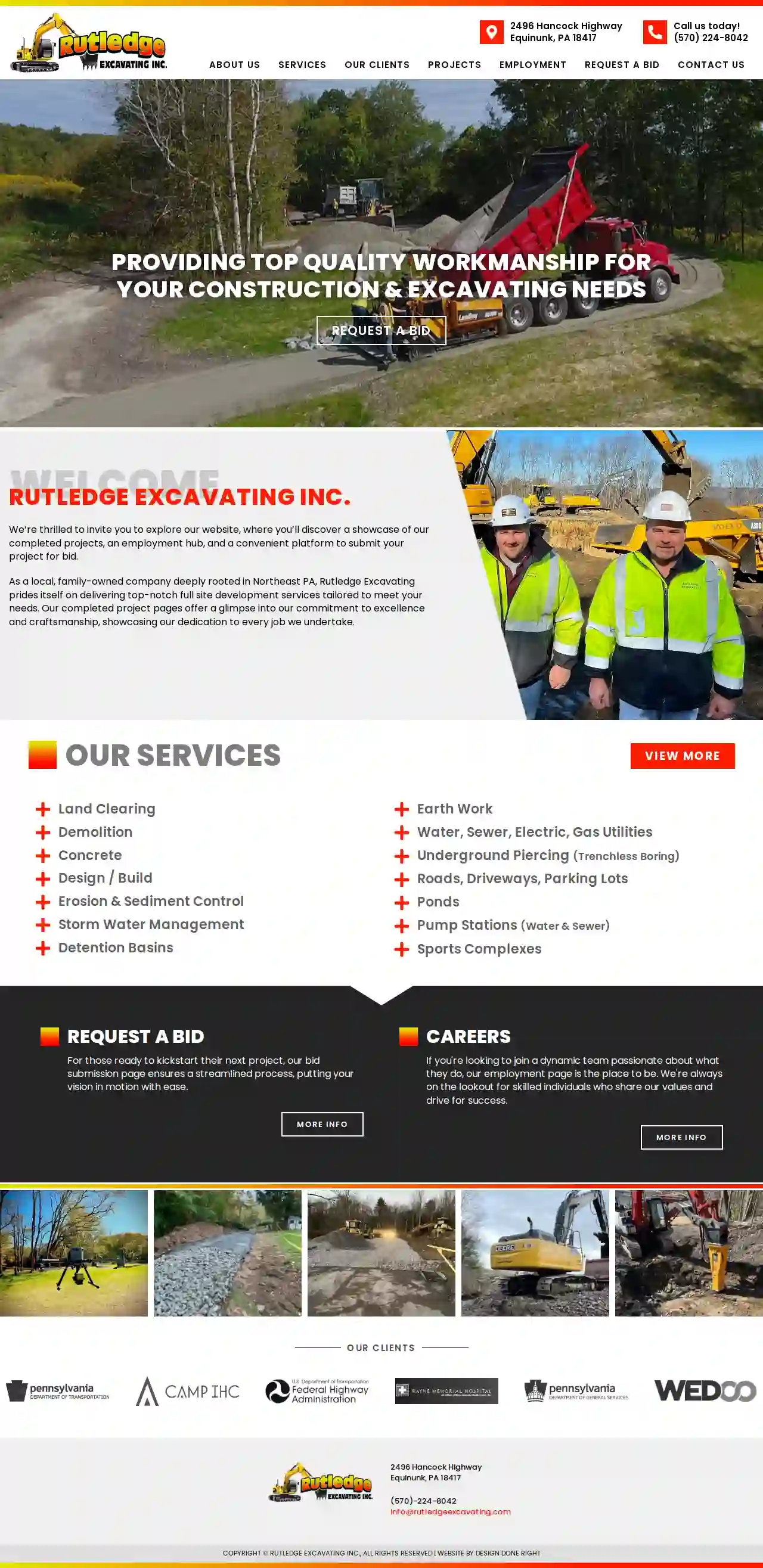
Rutledge Excavating Inc.
3.56 reviews2496 Hancock Highway, Equinunk, 18417, USWELCOME RUTLEDGE EXCAVATING INC. We’re thrilled to invite you to explore our website, where you’ll discover a showcase of our completed projects, an employment hub, and a convenient platform to submit your project for bid. As a local, family-owned company deeply rooted in Northeast PA, Rutledge Excavating prides itself on delivering top-notch full site development services tailored to meet your needs. Our completed project pages offer a glimpse into our commitment to excellence and craftsmanship, showcasing our dedication to every job we undertake. OUR SERVICES View More Land Clearing Demolition Concrete Design / Build Erosion & Sediment Control Storm Water Management Detention Basins Earth Work Water, Sewer, Electric, Gas Utilities Underground Piercing (Trenchless Boring) Roads, Driveways, Parking Lots Ponds Pump Stations (Water & Sewer) Sports Complexes REQUEST A BID For those ready to kickstart their next project, our bid submission page ensures a streamlined process, putting your vision in motion with ease. MORE INFO CAREERS If you're looking to join a dynamic team passionate about what they do, our employment page is the place to be. We're always on the lookout for skilled individuals who share our values and drive for success. MORE INFO
- Services
- Why Us?
- Gallery
Get Quote
Four Bridges Construction & Renovations
131 Main St, Staten Island, 10307, USAbout Four Bridges Construction & Renovations At Four Bridges, we are residential and commercial contractors serving Staten Island and the Tri-State Area. We bring a unique blend of vision and experience, both as building designers and builders, allowing us to offer valuable insight and advice to help you design your dream home, remodel, or addition. We handle site development, planning, zoning, and navigate any hurdles you might encounter in your building project. We stay abreast of the latest construction trends to ensure your project is built with the highest quality and efficiency. Let our years of experienced designing and building work for you.
- Services
- Why Us?
- Gallery
Get Quote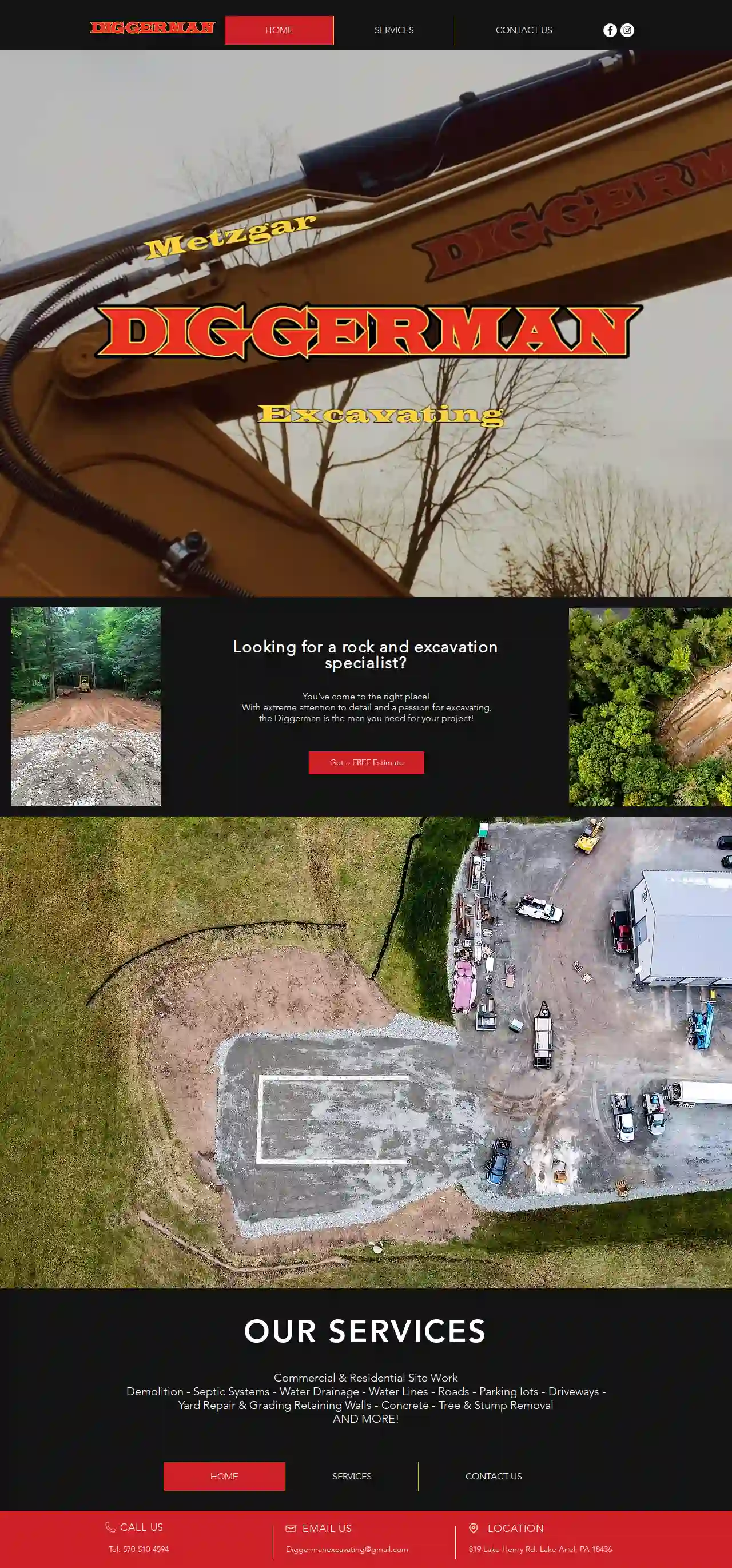
Diggerman Excavating
819 Lake Henry Rd., Lake Ariel, 18436, USLooking for a rock and excavation specialist? You've come to the right place! With extreme attention to detail and a passion for excavating, the Diggerman is the man you need for your project!
- Services
- Why Us?
- Gallery
Get Quote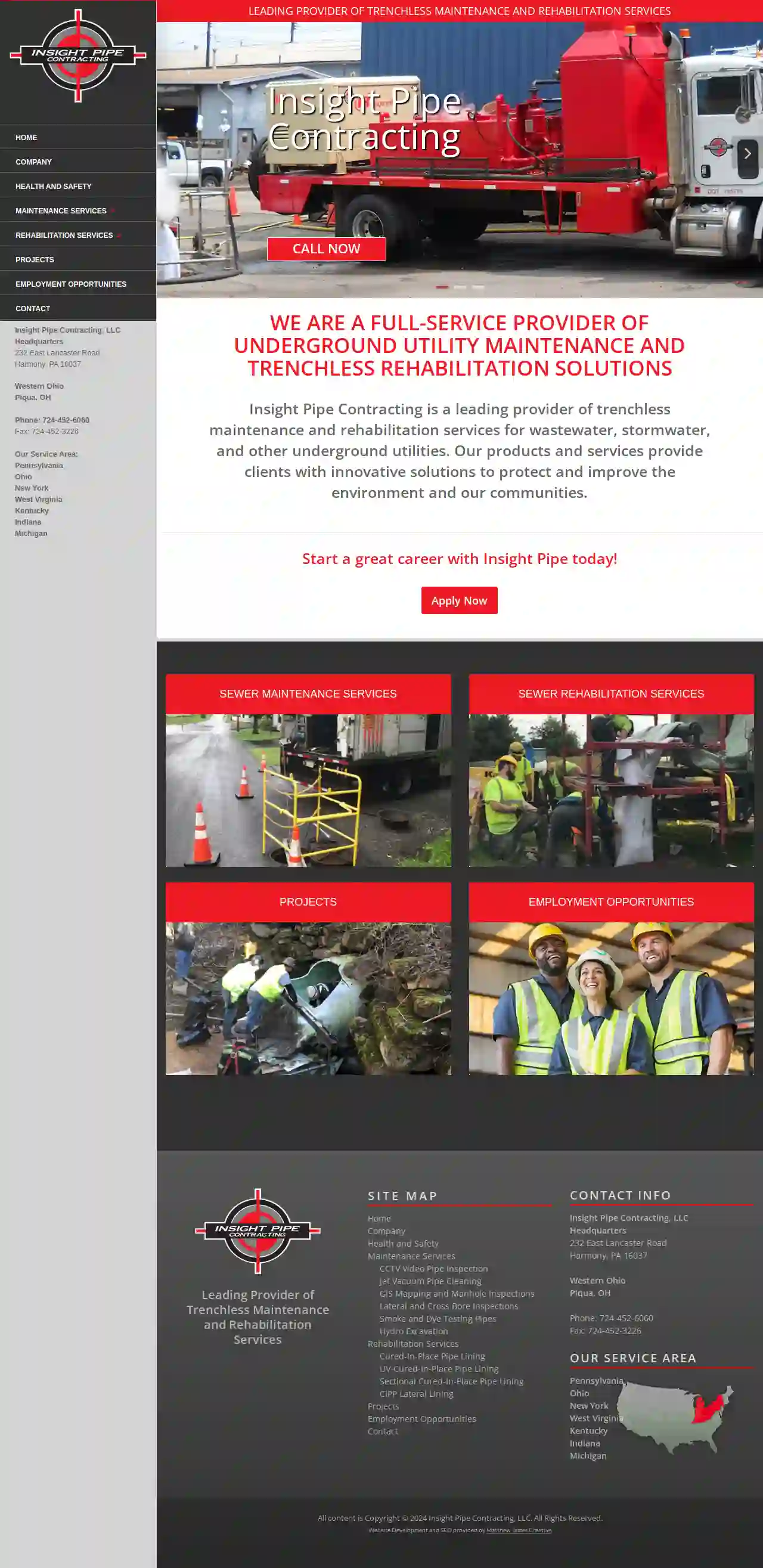
Insight Pipe Contracting, LLC
3.912 reviews232 East Lancaster Road, Harmony, 16037, USInsight Pipe Contracting, LLC Insight Pipe Contracting is a leading provider of trenchless maintenance and rehabilitation services for wastewater, stormwater, and other underground utilities. Our products and services provide clients with innovative solutions to protect and improve the environment and our communities.
- Services
- Why Us?
- Gallery
Get Quote
David H. Martin Excavating, Inc.
4.350 reviews4961 Cumberland Highway, Chambersburg, 17202, USYour Complete Excavating Solution Your projects deserve a reliable partner in delivering highly trained and trusted excavation solutions for jobs of any size. Our highly trained team is equipped with the skills and capabilities designed for residential homeowners to commercial project managers. Excellence & Integrity We understand the frustrations that arise with extended project completion dates, unexpected costs, and uncommunicative teams. Excellence and integrity are at the core of everything we do—it’s not just what we do, but the foundation for all that we are. Expect your project to be completed and on time—everytime.
- Services
- Why Us?
- Our Team
- Testimonials
Get Quote
Kirby Kitner Excavating & Paving
4.86 reviews7214 Spring Road, New Bloomfield, USWelcome to Kirby Kitner Excavating! Whether it is site prep for new structures, foundations, road building, graves sites, drainage or septic systems, Kirby consults with all customers personally and is present on all job sites to assure you of quality workmanship. Our staff is professional, experienced, and dependable. We are celebrating our 39th year in business. Kirby Kitner Excavating is a local, family-owned business. Our company is fully insured and we give free estimates. Kirby Kitner Excavating is a DOT Registered Motor Carrier: USDOT 2291670 and a Registered PA Contractor: # PA027056. We are members of the Perry County Chamber of Commerce. Kirby Kitner Excavating is located at 7214 Spring Road, New Bloomfield, PA.
- Services
- Why Us?
- Gallery
Get Quote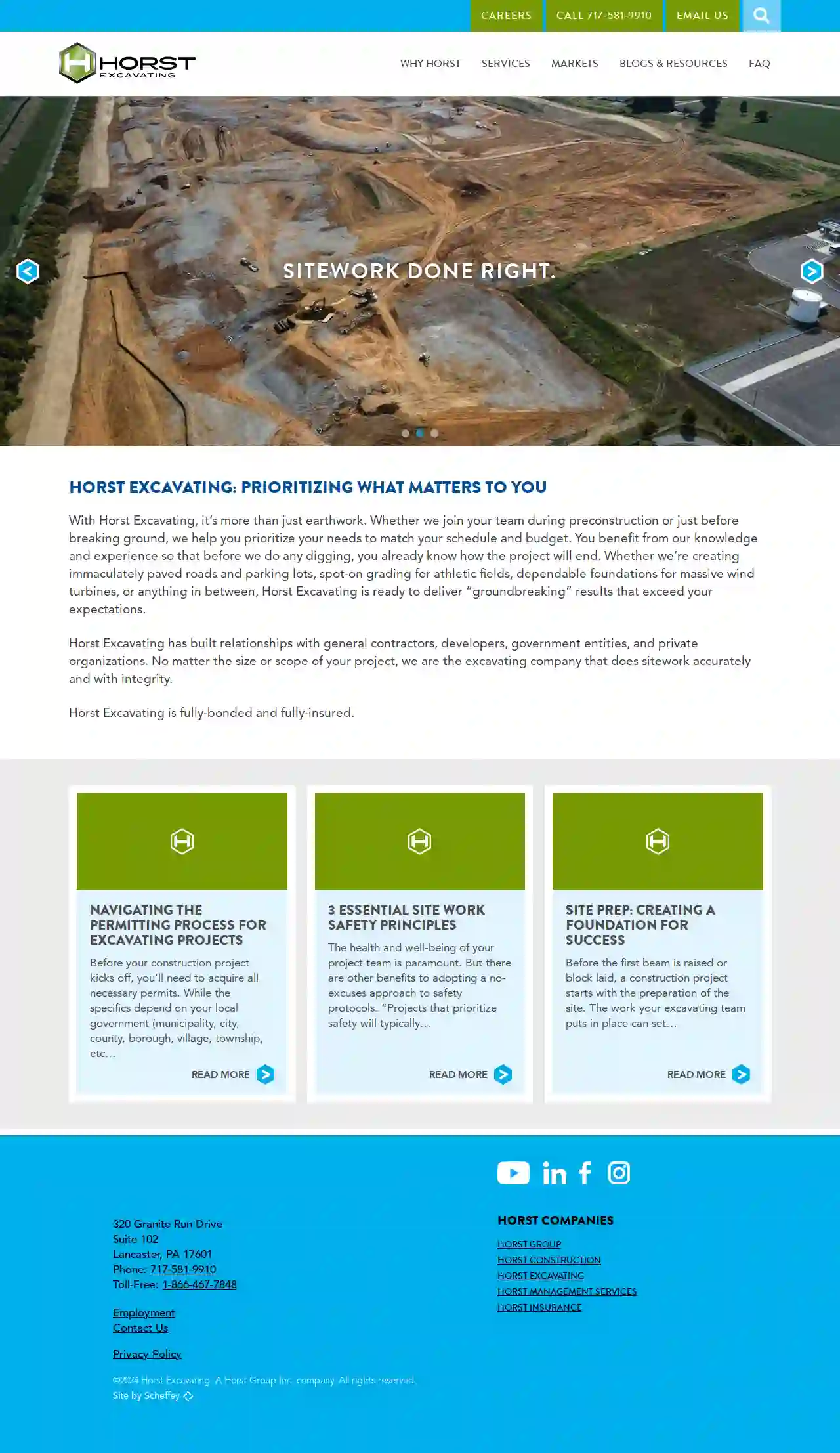
Horst Excavating
416 reviews320 Granite Run Drive, Suite 102, Lancaster, 17601, USHorst Excavating: Prioritizing What Matters To You With Horst Excavating, it’s more than just earthwork. Whether we join your team during preconstruction or just before breaking ground, we help you prioritize your needs to match your schedule and budget. You benefit from our knowledge and experience so that before we do any digging, you already know how the project will end. Whether we’re creating immaculately paved roads and parking lots, spot-on grading for athletic fields, dependable foundations for massive wind turbines, or anything in between, Horst Excavating is ready to deliver “groundbreaking” results that exceed your expectations. Horst Excavating has built relationships with general contractors, developers, government entities, and private organizations. No matter the size or scope of your project, we are the excavating company that does sitework accurately and with integrity. Horst Excavating is fully-bonded and fully-insured.
- Services
- Why Us?
- Gallery
Get Quote
Over 22,076+ Excavation Pros registered
Our excavation companies operate in Exeter & surroundings!
ExcavationHQ has curated and vetted Top Excavation Businesses near Exeter. Find a top & trustworthy pro today.
Frequently Asked Questions About Demolition Contractors
- Size and Complexity of the Structure: Larger and more complex structures, such as multi-story buildings, require more time, labor, and specialized equipment, increasing costs.
- Type of Demolition: Different demolition methods, such as implosion, wrecking ball, or high-reach demolition, have varying costs.
- Material Disposal: Disposal fees for demolition debris can contribute significantly to the overall cost, depending on the type and quantity of materials.
- Location and Accessibility: Demolition in densely populated areas or with limited access may require more planning and specialized equipment, affecting costs.
- Hazardous Materials: The presence of asbestos, lead paint, or other hazardous materials requires specialized removal and disposal procedures, adding to the expenses.
- Waste Generation: Demolition generates a large volume of debris, contributing to landfill space and potentially releasing harmful substances into the environment if not disposed of properly.
- Air Pollution: Dust and particulate matter released during demolition can impact air quality, affecting human health and the environment.
- Noise Pollution: Demolition activities can generate significant noise, disturbing nearby residents and wildlife.
- Resource Depletion: Demolition consumes resources that could be salvaged and reused, contributing to resource depletion and environmental degradation.
- Clear the Site: Remove all furniture, appliances, personal belongings, and any valuable items from the structure.
- Secure the Perimeter: Fence off the demolition area to prevent unauthorized access and protect surrounding property.
- Disconnect Utilities: Arrange for the disconnection of electricity, gas, water, and other utilities servicing the building.
- Hazardous Material Abatement: If asbestos, lead paint, or other hazardous materials are present, have them professionally removed before demolition begins.
- Notify Neighbors: Inform your neighbors about the demolition schedule to minimize disruptions and address any concerns.
- Obtain Permits: Ensure all necessary demolition permits are in place before starting work.
- 'Can I see proof of your licensing and insurance?' Verify their credentials and coverage.
- 'What experience do you have with projects like mine?' Ensure they have relevant expertise.
- 'Can you provide references from past clients?' Check their reputation and customer satisfaction.
- 'What are your safety protocols?' Prioritize contractors who emphasize safety.
- 'How will you handle hazardous materials?' Ensure they have proper procedures for asbestos or lead abatement.
- 'What is your timeline for completing the project?' Understand the project duration.
- 'How will you manage noise, dust, and debris?' Discuss mitigation measures for minimizing disruption.
- 'What are your payment terms?' Clarify payment schedules and any required deposits.
How much does demolition cost in the USA?
What are the environmental impacts of demolition?
How do I prepare my property for demolition?
What questions should I ask a demolition contractor before hiring them?
How much does demolition cost in the USA?
- Size and Complexity of the Structure: Larger and more complex structures, such as multi-story buildings, require more time, labor, and specialized equipment, increasing costs.
- Type of Demolition: Different demolition methods, such as implosion, wrecking ball, or high-reach demolition, have varying costs.
- Material Disposal: Disposal fees for demolition debris can contribute significantly to the overall cost, depending on the type and quantity of materials.
- Location and Accessibility: Demolition in densely populated areas or with limited access may require more planning and specialized equipment, affecting costs.
- Hazardous Materials: The presence of asbestos, lead paint, or other hazardous materials requires specialized removal and disposal procedures, adding to the expenses.
What are the environmental impacts of demolition?
- Waste Generation: Demolition generates a large volume of debris, contributing to landfill space and potentially releasing harmful substances into the environment if not disposed of properly.
- Air Pollution: Dust and particulate matter released during demolition can impact air quality, affecting human health and the environment.
- Noise Pollution: Demolition activities can generate significant noise, disturbing nearby residents and wildlife.
- Resource Depletion: Demolition consumes resources that could be salvaged and reused, contributing to resource depletion and environmental degradation.
How do I prepare my property for demolition?
- Clear the Site: Remove all furniture, appliances, personal belongings, and any valuable items from the structure.
- Secure the Perimeter: Fence off the demolition area to prevent unauthorized access and protect surrounding property.
- Disconnect Utilities: Arrange for the disconnection of electricity, gas, water, and other utilities servicing the building.
- Hazardous Material Abatement: If asbestos, lead paint, or other hazardous materials are present, have them professionally removed before demolition begins.
- Notify Neighbors: Inform your neighbors about the demolition schedule to minimize disruptions and address any concerns.
- Obtain Permits: Ensure all necessary demolition permits are in place before starting work.
What questions should I ask a demolition contractor before hiring them?
- 'Can I see proof of your licensing and insurance?' Verify their credentials and coverage.
- 'What experience do you have with projects like mine?' Ensure they have relevant expertise.
- 'Can you provide references from past clients?' Check their reputation and customer satisfaction.
- 'What are your safety protocols?' Prioritize contractors who emphasize safety.
- 'How will you handle hazardous materials?' Ensure they have proper procedures for asbestos or lead abatement.
- 'What is your timeline for completing the project?' Understand the project duration.
- 'How will you manage noise, dust, and debris?' Discuss mitigation measures for minimizing disruption.
- 'What are your payment terms?' Clarify payment schedules and any required deposits.